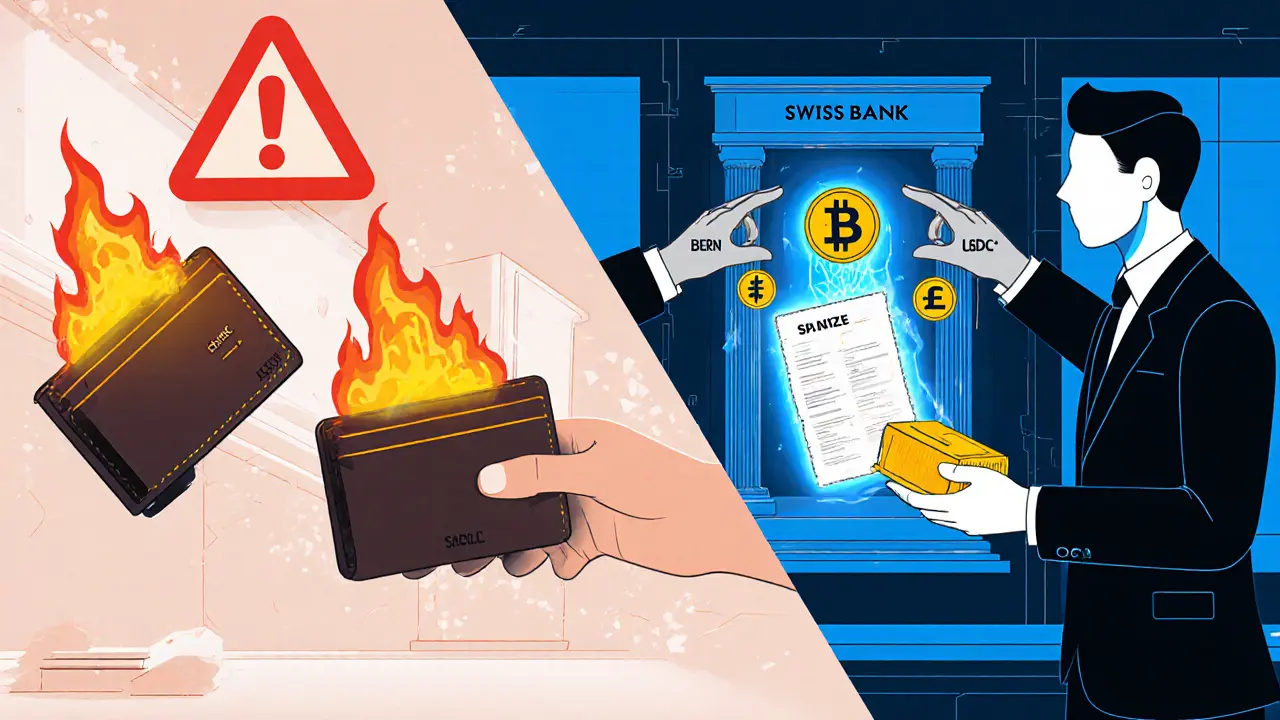Swiss Bank Cryptocurrency Services and Custody: How Swiss Banks Lead in Regulated Digital Asset Storage
 Nov, 21 2025
Nov, 21 2025
Crypto Asset Protection Calculator
Swiss banks protect your assets through legal segregation, multi-sig security, and zero thefts since 2020—unlike exchanges with $1.4B+ in hacks. This tool quantifies your protection value.
Risk Level: High (Exchange) vs Near Zero (Swiss Custody)
Estimated Protection Value: $0
Based on 0% theft rate, legal segregation, and 2023 industry data
Your assets are protected by Swiss legal segregation—meaning your crypto is never part of the bank's balance sheet. If the bank fails, your assets remain safe.
Key Protection Metrics
When it comes to storing cryptocurrency safely, most people think of hardware wallets or cold storage. But for institutions, hedge funds, and high-net-worth individuals, the real gold standard is Swiss bank cryptocurrency services and custody. Unlike unregulated exchanges or DIY solutions, Swiss banks offer institutional-grade security, legal clarity, and full integration with traditional finance-all under one roof. And they’ve been doing it better than anyone else for years.
Why Switzerland? It’s Not Just the Alps
Switzerland didn’t become the world’s crypto banking hub by accident. While the U.S. and EU were still debating whether crypto was a currency, a commodity, or a security, Swiss regulators took a different path. Instead of writing new laws from scratch, they applied existing financial market rules to digital assets. That’s it. No confusion. No regulatory gray zones. Just clear, consistent rules that banks could build on. This approach, called technology-neutral regulation, meant that when Bitcoin, Ethereum, or even newer tokens like SUI came along, Swiss banks didn’t need to wait for a new law. They could start offering custody, trading, and lending services immediately-under the same legal framework that protects traditional assets. By 2025, this head start had turned Switzerland into the only country where institutional investors could confidently move millions in crypto without fearing sudden regulatory crackdowns.The Big Four: Who’s Actually Doing This
Not every Swiss bank offers crypto services. But the ones that do are serious. Four names dominate the space: Sygnum Bank, Amina Bank, Bitcoin Suisse, and Swissquote. Each has carved out a niche, but they all share the same core promise: your crypto is safe, legal, and fully integrated with your bank account. Bitcoin Suisse runs one of the most secure custody systems in the world. Their proprietary Bitcoin Suisse Vault doesn’t just use encryption. It combines physical safes, electromagnetic pulse shielding, and air-gapped backups. Keys never leave Swiss soil. And they support over 40 blockchains-from Bitcoin to Solana-with staking for major networks like ETH, ADA, and DOT. Clients can vote on governance proposals directly through their online portal, something you won’t find on Coinbase or Kraken. Sygnum Bank, on the other hand, moved fast on emerging tokens. In August 2025, they became one of the first regulated institutions to offer custody and lending for SUI, the native token of the Sui blockchain. Within weeks, trading volume jumped from 14 million to over 36 million tokens per day. The price rose 4%, not because of hype, but because institutional buyers finally had a compliant way in. Amina Bank made headlines by becoming the first regulated bank globally to support SUI. They didn’t just list it-they built full banking services around it. You can open a SUI-denominated account, earn rewards in EURC stablecoins, and even get business banking packages designed for crypto startups. Their pitch? “The future of finance with a crypto bank account.” And for many, it’s already here.How Your Crypto Is Actually Protected
Forget the idea that crypto is just “digital cash.” In Swiss banks, it’s treated like a high-value asset-because it is. Security isn’t an add-on. It’s engineered into every layer. Custody systems use multi-signature wallets, where no single person can move funds. Private keys are split into parts and stored in geographically separate locations. One part might be in a Zurich vault, another in a data center near Bern, and a third in a secure facility outside Geneva. All access requires physical presence and biometric authentication. Even bank employees can’t access funds without a multi-person approval process. Cybersecurity is equally strict. Swiss banks run continuous threat monitoring, simulate hacking attempts weekly, and use AI to detect anomalies in transaction patterns. They’re also GDPR-compliant, meaning your data is encrypted, anonymized, and never sold. No third-party data brokers. No shady cloud providers. Everything stays under Swiss jurisdiction, where privacy laws are among the toughest in the world. And then there’s the legal shield. If a bank goes bankrupt, your crypto isn’t part of the liquidation pool. Swiss law treats custodied digital assets as separate from the bank’s balance sheet. That’s called segregation. It’s the same protection you get with stocks held in a brokerage account. Your crypto isn’t a loan to the bank-it’s held in trust for you.
What You Can Actually Do With These Accounts
This isn’t just storage. It’s full banking. You can:- Deposit fiat (CHF, EUR, USD) and instantly convert it to crypto
- Stake ETH, SOL, or ADA directly from your account and earn rewards
- Borrow against your crypto holdings without selling (up to 50% LTV in most cases)
- Trade between 200+ tokens with institutional-grade liquidity
- Receive dividends or governance rewards from DeFi protocols
- Send crypto to other bank accounts or wallets with audit trails
- Access your portfolio via mobile app, web portal, or API for automated trading
Why This Beats the U.S. and EU
In the U.S., banks are still being told by regulators to “only offer crypto services if they’re safe and sound.” That’s not a rule-it’s a suggestion. No clear guidelines. No licensing path. Just fear of enforcement. In the EU, MiCA (Markets in Crypto-Assets Regulation) is finally rolling out, but it’s a patchwork of national implementations. Some countries are slow. Others are hostile. No unified system exists yet. Switzerland? They’ve been operational since 2020. Their rules are stable. Their licenses are clear. Their infrastructure is proven. When a U.S. hedge fund wants to hold $50 million in crypto, they don’t look to New York or Chicago. They look to Zurich.Who Is This For? Not Everyone
These services aren’t for casual traders. Minimum balances often start at $100,000. Fees are higher than retail exchanges. Onboarding takes weeks because of strict KYC checks. You’ll need to prove your source of funds, provide legal entity documents (if you’re a company), and sit through compliance interviews. But if you’re a fund manager, a family office, a startup founder raising in crypto, or even a high-net-worth individual who wants to hold Bitcoin without worrying about hacks or legal ambiguity-this is the only real option.
The Future: More Tokens, More Integration
Swiss banks aren’t stopping. In 2025, they’re adding support for new Layer 1 chains, tokenized real-world assets (RWAs), and even private blockchain networks used by corporations. Expect to see custody for tokenized gold, bonds, and real estate in the next 12 months. They’re also integrating with traditional finance more deeply. You’ll soon be able to pay your mortgage in CHF, hold your salary in USDC, and invest in crypto-all from one dashboard. No more juggling 10 different apps. The goal isn’t to replace banks. It’s to make them better. To give people control without chaos. To offer innovation without risk.Frequently Asked Questions
Are Swiss crypto banks safe from hacks?
Yes, significantly safer than exchanges. Swiss crypto banks use institutional-grade custody systems with multi-signature wallets, air-gapped storage, physical vaults, and electromagnetic shielding. Keys never leave Switzerland, and access requires multiple authorized personnel. No single point of failure exists. There have been zero successful thefts from Swiss-regulated crypto custody accounts since 2020.
Can I open a crypto bank account in Switzerland as a non-resident?
Yes, most Swiss crypto banks accept international clients, including those from the U.S., UK, and Asia. However, you’ll need to complete full KYC and AML checks, which may include providing tax identification numbers, proof of address, and documentation of your source of funds. Some banks require an in-person meeting or video verification. It takes 2-6 weeks, but it’s possible.
Do Swiss crypto banks offer insurance for my assets?
They don’t offer traditional insurance like FDIC. Instead, they use legal segregation: your crypto is held in trust and kept separate from the bank’s own assets. If the bank fails, your holdings are protected from creditors. Many also carry cyber liability insurance and third-party security audits, but the real protection comes from Swiss law and custody structure-not an insurance policy.
What’s the minimum deposit to use Swiss crypto banking services?
Minimums vary by bank. Bitcoin Suisse and Sygnum typically require $100,000 in initial assets for institutional custody accounts. Amina Bank offers lower entry points for individuals-starting around $25,000-but with fewer features. Retail accounts with Swissquote may start at $5,000, but these are more like trading accounts than full custody solutions.
Can I use a Swiss crypto bank to avoid taxes?
No. Swiss banks comply with global tax reporting standards, including CRS (Common Reporting Standard) and FATCA. They report account information to tax authorities in your home country. Using a Swiss crypto bank doesn’t make your crypto tax-free-it just makes your holdings safer and more compliant. Tax obligations still apply based on your residency.
How do Swiss banks handle crypto forks and airdrops?
Most Swiss crypto banks automatically credit forked assets (like Bitcoin Cash after the 2017 fork) to eligible accounts. Airdrops are handled on a case-by-case basis. If the asset is deemed compliant and technically secure, it’s added to your portfolio. You’ll receive a notification and can choose to keep or sell. No manual claims needed.
Are stablecoins supported?
Yes. Major stablecoins like USDC, EURC, and CHFt are fully supported across all major Swiss crypto banks. Some even offer interest-bearing accounts for stablecoins, with yields higher than traditional savings accounts. EURC, issued by a Swiss-regulated entity, is particularly popular among European clients for its transparency and regulatory backing.
Kaitlyn Boone
November 21, 2025 AT 16:24Swiss banks are great and all but why does everything have to cost 100k just to play? I mean i get security but its like they want you to be rich before you can even ask questions
James Edwin
November 22, 2025 AT 06:02This is exactly what crypto needed for years. No more guessing games with regulators. Swiss banks are the quiet giants who actually built something real instead of just chasing hype. If you want real safety, this is it.
LaTanya Orr
November 22, 2025 AT 07:52It's funny how we think of crypto as this wild new frontier but the real innovation is just applying old rules to new things. Switzerland didn't reinvent finance. They just refused to panic. And that's the quietest kind of genius
Ashley Finlert
November 22, 2025 AT 21:25Switzerland didn’t just become a hub-it became a sanctuary. Where others saw chaos, they saw structure. Where others feared disruption, they saw evolution. This isn’t about banking. It’s about civilization choosing stability over spectacle. And for that, the world owes them gratitude.
Chris Popovec
November 23, 2025 AT 16:18Let’s be real-this is all a front. Swiss banks are just fronting for the IMF and the Bilderberg Group. They’re not protecting your crypto-they’re locking it down so they can track every move. You think your keys are safe? They’re just stored in a vault with a backdoor labeled ‘Compliance’.
Marilyn Manriquez
November 23, 2025 AT 17:16Finally someone is doing it right. Long overdue. The world needs this kind of clarity. Not speculation. Not fear. Just clean, lawful, responsible innovation. Thank you Switzerland.
taliyah trice
November 24, 2025 AT 00:14i just want to know if i can buy solana with my savings account
Charan Kumar
November 25, 2025 AT 17:44Swiss banks are good but what about India? We have over 100 million crypto users and no one here can even open a wallet without getting flagged by the tax department. Why does everything have to be in Zurich?
Peter Mendola
November 26, 2025 AT 13:50Zero thefts since 2020? That’s statistically impossible. There’s no such thing as unhackable. Just unreported. And don’t even get me started on the tax loopholes.
Terry Watson
November 28, 2025 AT 02:05Can we talk about how insane it is that you can stake ETH, earn EURC rewards, borrow against your holdings, and get tax reports-all from one app? This isn’t banking. This is magic. And it’s real. I’ve used it. It works. You’re not dreaming.
Sunita Garasiya
November 29, 2025 AT 05:18Oh so now Switzerland is the new Silicon Valley? Next they’ll be selling digital Alps NFTs with blockchain-backed snowflakes. Meanwhile in India we’re still trying to figure out if crypto is legal or a crime. But sure, let’s all bow to the alpine bankers
Mike Stadelmayer
November 29, 2025 AT 06:12People act like this is some secret club but honestly? It’s just common sense. If you’re holding serious money, you don’t leave it on an exchange. You don’t trust random cold wallets. You go where the rules are clear and the vaults are real. Switzerland didn’t outsmart anyone. They just didn’t overcomplicate it.
Norm Waldon
December 1, 2025 AT 05:00Switzerland? More like Switzerland Inc.-a corporate puppet state funded by global elites who want to control the flow of digital wealth. They’re not protecting you. They’re containing you. And once you’re in their system, you never leave. Ever. Don’t be fooled by the clean banks and polite accents.
neil stevenson
December 2, 2025 AT 07:21Swiss banks are legit. I’ve been using Sygnum for 2 years. No drama. No crashes. Just steady, boring, beautiful security. 🤝
Samantha bambi
December 4, 2025 AT 02:54I love how this post doesn’t mention the fact that Swiss banks charge $2,500 just to open an account. It’s not about safety-it’s about exclusivity. They want you to prove you’re worthy before they’ll even look at your crypto.
Anthony Demarco
December 5, 2025 AT 09:10Everyone talks about Switzerland like it’s the answer but what about the rest of us? What about the people who don’t have $100k? Who’s protecting the small holders? You talk about segregation and legal frameworks but what about justice? What about access? This isn’t innovation-it’s gated privilege
Lynn S
December 6, 2025 AT 13:36Let me be perfectly clear: if you are not using a Swiss-regulated custody provider, you are not storing crypto-you are gambling. And if you think Coinbase or Kraken is safe, you are either naive or dangerously uninformed. There is no comparison. None. Zero. This is not a matter of opinion. It is a matter of survival.
James Edwin
December 7, 2025 AT 10:03Exactly. And the fact that you need $100k to even walk through the door? That’s not exclusion-it’s risk management. The system isn’t broken. It’s just designed for people who actually understand what they’re holding. The rest? They’re still waiting for a fairy tale called ‘DeFi’.